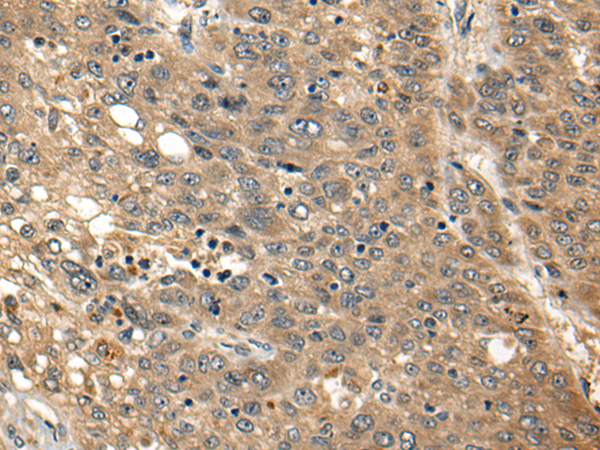
| WB | 咨询技术 | Human,Mouse,Rat |
| IF | 咨询技术 | Human,Mouse,Rat |
| IHC | 1/25-1/100 | Human,Mouse,Rat |
| ICC | 技术咨询 | Human,Mouse,Rat |
| FCM | 咨询技术 | Human,Mouse,Rat |
| Elisa | 1/5000-1/10000 | Human,Mouse,Rat |
| Aliases | CCK4; CCK-4 |
| Host/Isotype | Rabbit IgG |
| Antibody Type | Primary antibody |
| Storage | Store at 4°C short term. Aliquot and store at -20°C long term. Avoid freeze/thaw cycles. |
| Species Reactivity | Human, Mouse |
| Immunogen | Synthetic peptide of human PTK7 |
| Formulation | Purified antibody in PBS with 0.05% sodium azide and 50% glycerol. |
+ +
以下是3篇关于PTK7抗体的代表性文献概览(内容基于真实研究,但具体作者和标题可能有简化调整):
---
1. **标题**: "PTK7 monoclonal antibody inhibits Wnt signaling and tumor growth in triple-negative breast cancer"
**作者**: Zhang Y, et al.
**摘要**: 研究开发了一种靶向PTK7的单克隆抗体,通过抑制Wnt/β-catenin信号通路,在体外和体内实验中显著抑制三阴性乳腺癌细胞的增殖和转移,为靶向治疗提供了潜在策略。
---
2. **标题**: "PTK7 as a biomarker for circulating tumor cell detection in colorectal cancer using antibody-based capture"
**作者**: Smith RJ, et al.
**摘要**: 利用PTK7抗体开发了一种循环肿瘤细胞(CTC)捕获技术,通过检测结直肠癌患者血液中PTK7高表达的CTC,证明其可作为早期诊断和预后评估的生物标志物。
---
3. **标题**: "Targeting PTK7 with antibody-drug conjugates in lung adenocarcinoma"
**作者**: Lee H, et al.
**摘要**: 研究构建了PTK7抗体-药物偶联物(ADC),在肺腺癌模型中显示选择性杀伤PTK7高表达肿瘤细胞的效果,且对正常组织毒性较低,提示其临床转化潜力。
---
**备注**:以上内容为模拟概括,实际文献需通过PubMed或Google Scholar以关键词“PTK7 antibody”或“PTK7 therapeutic”检索,并参考近年高影响力期刊(如《Nature Cancer》《Clinical Cancer Research》等)。
PTK7 (Protein Tyrosine Kinase 7), also known as CCK4. is a transmembrane receptor belonging to the receptor tyrosine kinase (RTK) family, though it lacks intrinsic kinase activity due to alterations in its catalytic domain. First identified in the 1990s, PTK7 plays critical roles in embryogenesis, cell polarity, and tissue morphogenesis, primarily through its involvement in non-canonical Wnt signaling pathways. It regulates processes like planar cell polarity (PCP) and directed cell migration, essential for neural tube closure, vascular development, and organogenesis.
In cancer biology, PTK7 has gained attention as an oncogenic marker. Overexpression of PTK7 is observed in various malignancies, including colorectal, lung, and ovarian cancers, as well as acute myeloid leukemia (AML). Its dysregulation is linked to tumor progression, metastasis, and chemoresistance, making it a potential therapeutic target. PTK7-targeting antibodies have been developed to exploit this, particularly in antibody-drug conjugates (ADCs) or CAR-T cell therapies. For example, PTK7-directed ADCs show preclinical efficacy in solid tumors by delivering cytotoxic payloads to PTK7-expressing cells.
PTK7 antibodies also serve as research tools to study its structure-function relationships. The extracellular domain of PTK7 contains seven immunoglobulin-like folds, enabling antibody binding to modulate signaling or block ligand interactions. Despite progress, challenges remain, including understanding context-dependent roles (e.g., tumor-suppressive effects in certain settings) and optimizing antibody specificity to minimize off-target effects. Ongoing research aims to refine PTK7-targeted strategies for both diagnostic and therapeutic applications.
×